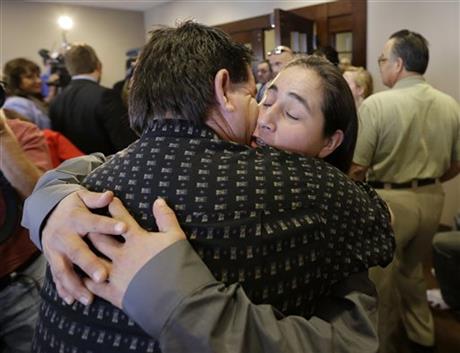
By WILL WEISSERT
Anna Vasquez, right, is hugged by family as she leaves a courtroom at the Bexar County Courthouse, Monday, Nov. 18, 2013, in San Antonio, after it was announced that three of four San Antonio women imprisoned for sexually assaulting two girls in 1994 were expected to walk free after a judge agreed that their convictions were tainted by faulty witness testimony. Vasquez, the fourth woman, has already been paroled, but under strict conditions. (AP Photo/Eric Gay)
Anna Vasquez
Anna Vasquez, center, walks past members of the media as she leaves a courtroom at the Bexar County Courthouse, Monday, Nov. 18, 2013, in San Antonio, after it was announced that three of four San Antonio women imprisoned for sexually assaulting two girls in 1994 were expected to walk free after a judge agreed that their convictions were tainted by faulty witness testimony. Vasquez, the fourth woman, has already been paroled, but under strict conditions. (AP Photo/Eric Gay)
Anna Vasquez
Anna Vasquez smiles as she leaves a courtroom at the Bexar County Courthouse, Monday, Nov. 18, 2013, in San Antonio, after it was announced that three of four San Antonio women imprisoned for sexually assaulting two girls in 1994 were expected to walk free after a judge agreed that their convictions were tainted by faulty witness testimony. Vasquez, the fourth woman, has already been paroled, but under strict conditions. (AP Photo/Eric Gay)
Prev
1 of 3
Next
SAN ANTONIO (AP) — Three of four San Antonio women imprisoned for sexually assaulting two girls in 1994 were expected to walk free Monday after a judge agreed that their convictions were tainted by faulty witness testimony, their defense attorney said.
Attorney Mike Ware said in a San Antonio courtroom Monday that the three women still behind bars would be released under bond on their own recognizance later in the day. Prosecutor Rico Valdez confirmed that an agreement he and Ware previously reached had been approved by a judge.
Elizabeth Ramirez, Kristie Mayhugh and Cassandra Rivera were convicted in 1998 of assaulting two of Ramirez’s nieces, ages 7 and 9, of successive attacks during a week in 1994. The girls testified that the women held them by their wrists and ankles, attacked them and threatened to kill them.
A fourth woman, Anna Vasquez, has already been paroled, but under strict conditions.
“It’s a breath of fresh air,” Vasquez told reporters after Ware made the announcement. “It’s an awesome feeling. It’s like a dream come true.”
While the women were not formally declared innocent of the crimes, prosecutors in Bexar County have said they do not intend to retry them if the Texas Court of Criminal Appeals vacates the convictions. Ramirez was given a 37-year prison sentence. Mayhugh, Vasquez and Rivera were given 15-year sentences.
More than a decade after the women were convicted, their case came to the attention of attorneys affiliated with the nonprofit Innocence Project of Texas, which investigates potential wrongful conviction cases. Ware, who has worked on the case for two years, filed petitions on their behalf last month with the Texas Court of Criminal Appeals.
They were convicted in 1998 based on an expert’s testimony that a vaginal injury sustained by the 9-year-old girl could have been caused by an assault. According to a petition filed by Ware, Dr. Nancy Kellogg testified that the injury in question happened around the time of the alleged assaults. But her conclusions have since been discredited by current findings on science, attorneys have said. Kellogg declined an interview request last week.
“It would be identified as non-specific if she were testifying today,” Valdez said last week.
Texas has passed several laws to add new safeguards for eyewitness identification, DNA testing and other issues in response to a rash of wrongful-conviction cases. Ware used one law passed this year to allow defendants to file appeals based on potential misuse of “junk science” — something criminal justice advocates have targeted as a frequent cause of wrongful convictions.
Prosecutors don’t agree with Ware that the women should be declared formally innocent — a distinction that would allow them to collect money Texas pays to the wrongfully imprisoned.
Ramirez, Mayhugh and Rivera were not in court Monday. Ramirez’s mother, Gloria Herrera, was and spoke about seeing her daughter last week as the agreement was being finalized.
“I went to visit her Wednesday and she was shaking like a leaf, and so was I,” Herrera said. “And she said, ‘Mom, I’m so nervous.'”
Herrera said she and her daughter hadn’t decided what they would do when Ramirez went free — other than she knew Ramirez wanted a pizza.
“In the beginning there was no hope but this day has finally arrived,” Herrera said. “I pray that this doesn’t happen to anybody else.”


